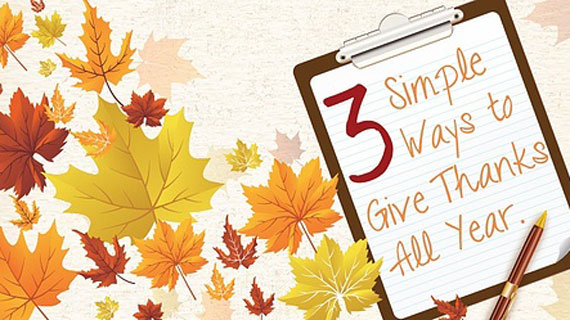3 Simple Ways to Give Thanks All Year
Posted: November 22, 2016 | Author: Abigail Wyatt | Read Time: 3 minutes

The secret to happiness has been found! The key is to give thanks. It’s simple, easy and can make a lasting impact on your life. So before you bring out the turkey and stuffing this Thanksgiving, take a look at how gratitude can affect your happiness year round. According to Dr. Shawn Christiansen, a certified social worker specializing in relationships and families for the past 26 years and Dean of the College of Education and Human Development at Southern Utah University, said “gratitude, appreciation and admiration predict stability and happiness in a relationship.”
Through his years working and teaching others about marriage and family relations, marital problems and solutions, and family life education, Christiansen has learned that a little thanks everyday goes a long way to ensuring a healthy relationship with those you are closest to.
“Who doesn’t love to hear good things about themselves,” said Christiansen. “When someone shares appreciation or thankfulness with us it shows us they are our confidant, cheerleader, and friend.”
To test this theory, Natasha Lewis, a psychology major at SUU, spent the past year researching the impact of gratitude on relationships to present at the Rocky Mountain Psychology Association Conference. She studied 58 married adults over three weeks. Everyday the participants had to write three things they appreciated about their significant other and why. They were then encouraged to share those observations with their partner.
At the end of the research the test subjects reported improvement in both their life and marital satisfaction. Lewis anticipated some improved signs of happiness, but was surprised by how much couples reported an increase in appreciation for their spouse.
"Gratitude journals aren't the only things that can help your outlook on life," said Lewis. "Anything you do to practice thankfulness is worth the effort, and you can practice showing appreciation to anyone. All relationships benefit from simple acts of kindness.”
Christiansen suggested incorporating three simple habits of gratitude into your daily routine that will help you give thanks all year long.
Keep a gratitude journal where you write down three things you’re thankful for and why every day. Share it with others. It may seem difficult at first, but with time it will become easier to think of things you’re grateful for. Before you know it, gratitude will become second nature to you.
John Gottman, world renowned marital psychologist, discovered that while you may think positive thoughts about others, these thoughts need to be verbalized in order for them to feel your love.
Christiansen also added that, “expressing gratitude can help you avoid becoming complacent with life and taking others for granted.”
2. Counteract Conflict
Everyone has a bad day or disagreement now and then. When this happens, try to remember the things you’re thankful for. This will help you focus on the positive, improve your mood and put yourself in other people’s shoes.
Ted Futris and his colleagues at the University of Georgia researched gratitude. They discovered that learning to say thank you for specific things helps people feel connected, which acts as a buffer during conflict.
3. Focus on the Good
By choosing to be grateful you automatically focus on the good things in life. When something bad or disappointing happens, try to find a positive outlook.
Futris learned that negativity creates more negativity, while positivity creates more positivity. The more you cultivate a culture of gratitude and appreciation the easier it will be to stay positive and upbeat.
Giving thanks doesn’t have to end with the last bite of pumpkin pie during Thanksgiving dinner. Whether you start keeping a gratitude journal, focus on the good or simply try to be positive despite opposition, you will find that a daily attitude of gratitude will help improve your quality of life for years to come.
This article was published more than 3 years ago and might contain outdated information or broken links. As a result, its accuracy cannot be guaranteed.

